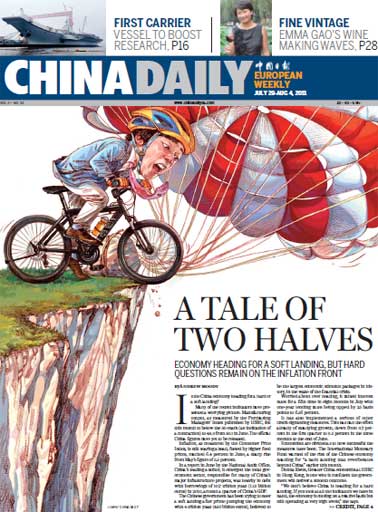New horizons for education
Updated: 2011-07-29 11:37
By Ken Starkey (China Daily European Weekly)
Business schools must come out with more sustainable strategies
|
 |
Every Western university values its ability to attract students from around the world. Figures show that in 2009 well over 3 million students furthered their education outside their country of domicile, with China and India combined providing around a fifth of them.
The quest to expound and extend the management wisdom of the West makes the business school arena especially competitive. In the wake of the global financial crisis, however, the role of business schools has increasingly been called into question.
It is Philip Delves Broughton's Ahead of the Curve, the best-selling story of the author's two years among what he called Harvard's "jargon-spewing, values-destroying financiers", that most famously draws attention to certain institutions' supposed culpability in the worst economic collapse since the Great Depression.
The book may have made Delves Broughton "the man business schools love to hate", but his premise cannot be dismissed out of hand - particularly in an era when higher education, like finance before it, is being dramatically transformed by the phenomenon that is globalization. Were business schools genuinely a part of the problem, as Delves Broughton contends? And, if so, can they now become a part of the solution?
In considering these questions we must first recognize the remarkable reach of the economic narrative that has shaped the past half-century. In effect, this narrative was written by eminent economists whose theories argue that a certain form of economic rationality is creating a brave new world. The work of Nobel laureates such as Merton Miller, Myron Scholes and Robert Merton lays the foundations not just for a financial environment driven by myths - chief among them the notion of the efficient market - but for a particular variety of financial economics to triumph as the defining management narrative of our time.
In keeping with the American philosopher Nelson Goodman's concept of "worldmaking", this narrative became firmly entrenched. It dictates the way the world is supposed to work. Options, derivatives, leverage as a key to prosperity, self-regulating markets, self-correcting problems, built-in controls, risk management - to borrow Goodman's phrase, the given is acknowledged as taken.
And it does not stop there. The JP Morgan Guide to Credit Derivatives is referred to within the company as "the bible". Goldman Sachs claims to be doing "God's work" even as the financial firestorm raged in earnest. Wall Street sees itself as home to the self-appointed "masters of the universe". The finance industry proclaims itself the "engine of growth".
As less powerful rival narratives falls away, traditional business models become redundant. The ideals of service and customer relationships faded from view. The search for greater profits amid the intricacies of casino banking supplanted long-term investment in the productive economy. Starved of insider knowledge or impartial advice, borrowers are encouraged to be reckless. And the rest, as they say, is history.
Where do business schools fit into this? Inevitably, as recent literature has illustrated, they, too, do not escape the din of the economic narrative as mood music. Harvard's own Rakesh Khurana noted in 2007 that many had been "transformed from training grounds for general managers to institutions that trained professional investors and financial engineers, especially in the areas of investment banking, private equity and hedge funds". In 2008 Delves Brougthon condemned the propensity of top MBAs to aspire to "master of the universe" status. In journalist Gillian Tett's excellent Fool's Gold, published in 2009, one Wall Street veteran branded derivatives "financial hydrogen bombs built on personal computers by 26-year-olds with MBAs".
It is well worth reflecting on these criticisms in an age when tertiary education is poised to become every bit as global and intrinsically interlinked as the spheres of finance and economics. Ironically, the financial crisis may have temporarily slowed the rate of this metamorphosis; but it has not reversed it.
Any nation hoping to complete the journey from labor-intensive to knowledge-based economy has to cultivate an improved level of skills. This ineluctably augments the desire for higher education - and it is a desire these countries are not yet in a position to meet without outside assistance.
China, for instance, may be investing heavily in education, but, like other emerging economies, it will not be able to satisfy domestic demand, especially at postgraduate level. It has to encourage its students to study overseas, almost unavoidably in the West and most likely in the US and the UK.
There, if the criticisms of Delves Broughton and others are to be believed, there is a good chance these students will soon be introduced to a Western form of guanxi. They will join networks of influence. They will get to know "the right people". They will learn whom they should court and what they might expect in return. They will generate what is politely referred to as "social capital", precious little of which will ultimately be used for the greater good of society as a whole. They will begin to embrace the myth.
In China it is widely accepted that guanxi allows individuals and companies to gain preferential access to a host of scarce information and resources, including financial capital. Indeed, there is a growing consensus that small and medium-sized enterprises can hardly expect to survive without it. According to a study produced by academics at Nottingham University Business School in Ningbo, "wining and dining" has become so vital to many new firms in China that expenditure on entertainment accounts for almost 7 percent of their total assets. At worst - or at best, depending on one's viewpoint - guanxi facilitates insider trading, kick-backs and back-door deals. Yet few discourage it. Again, the given is acknowledged as taken.
Guanxi has its role, of course, whether in the most prestigious business schools or in the boardrooms and bars of China. But that role should not be to serve the interests of a chosen few to the exclusion of all others. Like business schools themselves, guanxi should function to benefit the wider world rather than to enrich a self-selected elite. The positive aspects should be supported and cultivated. The negative aspects should be carefully considered and, if necessary, appropriately regulated.
The most pressing of the many challenges that now confront the financial services industry is the need to develop a new narrative - one that offers an alternative to the privatization of gain and the socialization of loss and is safely removed from a Darwinian fight for survival in "efficient" but unforgiving markets.
In large part this is a matter of ethics, of fairness and trust, of how people are perceived and whether they actually care. Research carried out by Nottingham University Business School for the influential Financial Services Research Forum has repeatedly highlighted the degree to which the average consumer neither trusts financial providers nor considers them especially fair. A common thread running through the findings of various studies is disillusionment, a feeling that such trust as does exist in the mind of the customer is present only because of an overwhelming conviction that there are no superior alternatives.
It is a sad state of affairs when consumers are not just dissatisfied with the system but see no meaningful alternative, yet this is where we now stand. However much the investment community has endeavored to refashion its collective public image - and the extent of efforts in that direction remains a source of debate - the judgment must be that the effect, at least so far, has been negligible at best and that the road to redemption will be lengthy for all concerned.
The long-term objective - one that must be pursued on a genuinely global basis - has to be the creation of strategies that bring about sustainable shareholder, customer and societal value. Key to this will be new kinds of management practices and new forms of education and training; and if education and training are to dictate management practices rather than vice versa then it is in business schools that the tone will have to be set.
The issue is therefore this. Should the world's leading business schools be content to await the next narrative, leaving its composition to others before absorbing the trickle-down effects in the hope that the new mood music's coda will prove less disastrous than its predecessor's? Or do they have the means, the wherewithal and the enthusiasm - not to mention even an obligation - to try to write it themselves?
The author is a professor of Management and Organizational Learning at Nottingham University Business School, where he is also Director of Research.
E-paper

Ringing success
Domestic firms make hay as shopping spree by middle class consumers keeps cash registers ringing in Nanjing
Mixed Results
Crowning achievement
Living happily ever after
Specials

Ciao, Yao
Yao Ming announced his retirement from basketball, staging an emotional end to a glorious career.

Going the distance
British fitness coach comes to terms with tragedy through life changes

Turning up the heat
Traditional Chinese medicine using moxa, or mugwort herb, is once again becoming fashionable
